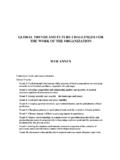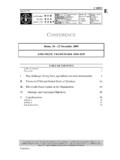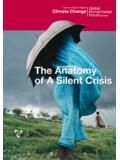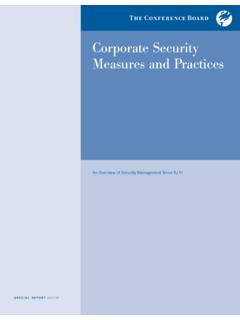Transcription of The Economics of Climate Change in Zanzibar
1 The Economics of Climate Change in Zanzibar Final Summary Report. July 2012 for Page i Executive Summary This study - the Economics of Climate Change in Zanzibar - has assessed the current and potential future impacts of Climate Change on the islands, the potential adaptation options to address these impacts, and the opportunities for low carbon development.
2 The key findings are set out below. Zanzibar s economy is very dependent on the Climate : a large proportion of GDP, employment and livelihoods are associated with Climate sensitive activities (in coastal, agriculture and tourism sectors). The Climate of Zanzibar is changing and recent decades have seen rising temperatures, increased rainfall variability, higher wind speeds and high-tide levels, and an increase in extreme events ( Climate variability). The latter have led to droughts and floods which have had major economic costs in terms of GDP. It is clear that Zanzibar is not adequately adapted to the current Climate , and there is an urgent need as well as a large economic benefit from addressing this existing adaptation deficit.
3 Zanzibar is putting in place impressive development plans and the MKUZA II Implementation Plan (IP) will help to reduce current vulnerability though development. However, the IP does not currently take short-term trends in Climate variability or future Climate Change into account, and it has not yet assessed how Climate Change might affect investments and planned outcomes. An initial screening of the IP has highlighted a number of high risk areas, where greater Climate resilience could be included, as well as identifying a number of potential opportunities for low carbon and adaptation finance. In the medium to longer term, Climate Change will lead to potentially high economic impacts on the islands.
4 There are potential threats from Climate Change on coastal and marine areas (including fisheries), tourism, agriculture, health, energy supply and demand, infrastructure, water resources and demand, and ecosystem services. Indeed, the combined effects of current Climate vulnerability and future Climate Change could be large enough to prevent Zanzibar achieving key economic growth, development and poverty reduction targets, including the planned timetable for achieving middle income status. Adaptation can reduce these impacts and there is emerging international finance available for funding. A broad set of potential adaptation options has been identified in the study.
5 These have been prioritised into a short-term priority plan, built around an adaptation pathway that maximises economic no regret opportunities, whilst building information to help decisions in the future, especially in the face of uncertainty. However, operationalizing adaptation and delivering such a plan will require significant funds, as well as institutional capacity. Building this capacity is an early key priority. The study has also considered the opportunities for Zanzibar to move towards a more sustainable, lower carbon pathway. The current use of energy on the islands is leading to economic , social and environmental impacts, and there are problems of load shedding and high back-up generation costs.
6 The analysis has considered current energy use and emissions on the islands, and future trends with planned development. While emissions increases will be necessary for Zanzibar s growth, and there is no suggestion that future emissions should be constrained, the study has found an alternative growth strategy based around low carbon options would be more sustainable, provide wider economic and environmental benefits, and could provide sources of financing to help fund the transition, while also meeting underlying development and growth objectives. It is stressed that these opportunities exist for energy use in households and transport, in agriculture and in natural resource management, as well as in the electricity sector in the form of renewables.
7 Finally, the study has set out the next steps. These focus around the development of a Zanzibar Climate Change Strategy, which includes consideration of Climate resilience and low carbon development, prioritisation of options and mainstreaming, and routes to finance. Page ii Table of Contents Introduction .. 1 Methods and Approach: Impacts and Adaptation.
8 1 Current Climate Variability and the economic Costs of Extreme Events .. 3 Projections of Climate Change and Sea Level Rise for Zanzibar .. 8 Socio- economic Projections and Climate Screening of Development .. 11 Impacts of Climate Change and Possible Adaptation Options .. 14 Low Carbon Growth .. 27 Recommendations and Next Steps .. 34 This work was led by the Global Climate Adaptation Partnership (GCAP), working with local partners (SUZA, IMS), with funding from UK (DFID) Government. It has been commissioned under DEW Point, the DFID Resource Centre for Environment, Water and Sanitation which is managed by a consortium of companies led by Harewelle International Limited. Authors: Paul Watkiss, Steve Pye, Gerard Hendriksen, Andrew Maclean and Muriel Bonjean.
9 Global Climate Adaptation Partnership, Narriman Jiddawi, Yohanna Shaghude IMS, Mohammed A Sheikh and Zakaria Khamis, State University of Zanzibar . The authors would like to thank the Revolutionary Government of Zanzibar : The First Vice President Office, Department of Environment, and the guidance of Dr Islam Salam, and the inputs of Dr Aboud Jumbe. We also would like to particularly thank Juma Baban VPO-E Pemba, for his input to the workshop and for arranging the Pemba site visit. We would also like to thank the team members at the State University of Zanzibar for their excellent organization of the stakeholder workshop events. We are particularly grateful for inputs on the provision of meteorological data from the Zanzibar office of the Tanzania meteorological agency (Khamis Ali Suleiman).
10 The work also benefited significantly from comments from Emilia Holken (UNDP) and from Michael Juel (SMOLE). We would also like to thank the Climate Systems Analysis Group (CSAG), University of Cape Town, SA, for the data provided by their Climate Change Explorer. It is stressed that the discussion here and any errors are the responsibility of the authors. The views expressed in this report are entirely those of the authors and do not necessarily represent the Revolutionary Government of Zanzibar or DFID s own views or policies. Page 1 Summary Report Introduction At the request of the Revolutionary Government of Zanzibar , the UK (DFID) Government has funded a study on the Economics of Climate Change in Zanzibar (Unguja, Pemba and other islands).





